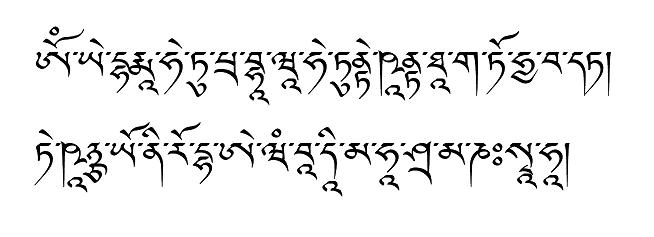Essence of Dependent Origination dharani: Difference between revisions
No edit summary |
No edit summary |
||
| Line 1: | Line 1: | ||
[[Image:Ye dharma.JPG|frame|ye dharma in Tibetan in Sogyal Rinpoche's calligraphy]] | |||
'''Ye Dharma''' | '''Ye Dharma''' | ||
''ye dharmā hetu prabhavā hetun teṣāṃ tathāgato hy avadat teṣāṃ ca yo nirodha evaṃ vādī mahāśramaṇaḥ'' | ''ye dharmā hetu prabhavā hetun teṣāṃ tathāgato hy avadat teṣāṃ ca yo nirodha evaṃ vādī mahāśramaṇaḥ'' | ||
This is the statement which [[Shariputra]] heard from the monk Ashvajit when asking for a summary of the teachings of the Buddha. Shariputra passed the message onto his close friend [[Maudgalyayana]] and together they became followers of the Buddha, and went on to become his foremost disciples. | This is the statement which [[Shariputra]] heard from the monk Ashvajit when asking for a summary of the teachings of the [[Buddha]]. Shariputra passed the message onto his close friend [[Maudgalyayana]] and together they became followers of the Buddha, and went on to become his foremost disciples. | ||
[[Khenpo Ngakchung]] explains that when it is used as a [[mantra]], oṃ is added at the beginning for auspiciousness and svāhā at the end for the sake of stability. | [[Khenpo Ngakchung]] explains that when it is used as a [[mantra]], oṃ is added at the beginning for auspiciousness and svāhā at the end for the sake of stability. | ||
| Line 10: | Line 11: | ||
"All phenomena arise from causes;<br> | "All phenomena arise from causes;<br> | ||
Those causes have been taught by the Tathagata, <br> | Those causes have been taught by the [[Tathagata]], <br> | ||
And their cessation too has been proclaimed by the Great Shramana."<br> | And their cessation too has been proclaimed by the Great [[Shramana]]."<br> | ||
===Tibetan translation=== | ===Tibetan translation=== | ||
''chos rnams thams cad rgyu las byung//''<br> | |||
chos rnams thams cad rgyu las byung//<br> | ''de rgyu de bzhin gshegs pas gsungs//''<br> | ||
de rgyu de bzhin gshegs pas gsungs//<br> | ''rgyu la ‘gog pa gang yin pa//''<br> | ||
rgyu la ‘gog pa gang yin pa//<br> | ''dge sbyong chen pos ‘di skad gsungs//'' | ||
dge sbyong chen pos ‘di skad gsungs// | |||
[[Category:Mantras]] | [[Category:Mantras]] | ||
[[Category:Key Terms]] | [[Category:Key Terms]] | ||
Revision as of 07:35, 5 May 2007

Ye Dharma
ye dharmā hetu prabhavā hetun teṣāṃ tathāgato hy avadat teṣāṃ ca yo nirodha evaṃ vādī mahāśramaṇaḥ
This is the statement which Shariputra heard from the monk Ashvajit when asking for a summary of the teachings of the Buddha. Shariputra passed the message onto his close friend Maudgalyayana and together they became followers of the Buddha, and went on to become his foremost disciples.
Khenpo Ngakchung explains that when it is used as a mantra, oṃ is added at the beginning for auspiciousness and svāhā at the end for the sake of stability.
Translation
"All phenomena arise from causes;
Those causes have been taught by the Tathagata,
And their cessation too has been proclaimed by the Great Shramana."
Tibetan translation
chos rnams thams cad rgyu las byung//
de rgyu de bzhin gshegs pas gsungs//
rgyu la ‘gog pa gang yin pa//
dge sbyong chen pos ‘di skad gsungs//